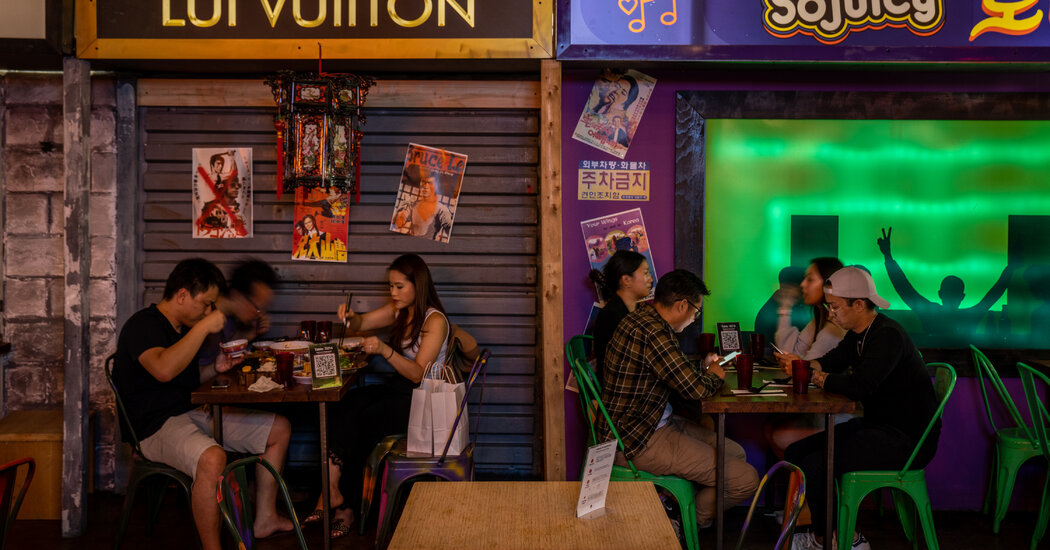
PORT ST. LUCIE, Fla. — Dansby Swanson gathered the final ground ball of the World Series last November, then peeked to second base for an easy force that would have clinched the title for the Atlanta Braves. When his double play partner, Ozzie Albies, was slow to break for the bag, Swanson changed direction and threw to first instead. Freddie Freeman, ever dependable, was sure to be there.
“He means everything to this team,” Swanson said later, in the afterglow of the team’s first championship in 26 seasons. “He’s been through good times, he’s been through the worst of times and now through the best of times. Nobody deserves it on our team more than him.”
It was hard to imagine, on that night of triumph in Houston, that Freeman would not return to Atlanta. A second-round pick of Atlanta in the 2007 draft, he had capped his 15th professional season with a World Series victory, a year after he won his first Most Valuable Player Award. Free agency would be a formality, right?
“Hey, I love him,” Terry McGuirk, Atlanta’s chairman, said with a laugh on the field after the last out of Game 6. “We’re not going to talk about that tonight.”
The Braves never did say the magic words to Freeman: Six years and $162 million, the deal Freeman has reached with the Los Angeles Dodgers. Dave Roberts, the Dodgers’ manager, told reporters in Glendale, Ariz., that Freeman was taking a physical exam on Thursday and would be in uniform on Friday.
Roberts, 49, said the Dodgers’ lineup was as strong as any he had seen. It could feature Freeman, Max Muncy, Trea Turner and Justin Turner in the infield; Chris Taylor, Cody Bellinger and Mookie Betts in the outfield; Will Smith at catcher; and A.J. Pollock as the designated hitter. Freeman, Betts and Bellinger have each won an M.V.P. award, like the left-handed starter Clayton Kershaw, who returns for his 15th season.
The M.L.B. Lockout Comes to an End
Superteams do not always win. The Dodgers were just as imposing late last summer, when they had the three-time Cy Young Award winner Max Scherzer in their rotation and Corey Seager at shortstop. Pierced by injury, they fell in the N.L. Championship Series to Atlanta, which won it all despite injuries to outfielder Ronald Acuña Jr. and the right-handed starter Mike Soroka.
Atlanta’s victory was a testament, in part, to the resourcefulness of General Manager Alex Anthopoulos, who jolted a depleted roster with a series of trades in July. This week, Anthopoulos swiftly pulled off another backup plan, trading with Oakland for an All-Star first baseman, Matt Olson, and signing him to an eight-year, $168 million contract.
The Braves have also signed the right-handed pitcher Collin McHugh (two years, $10 million) and re-signed outfielder Eddie Rosario (two years, $18 million) since moving on from Freeman.
“The thing Alex does really, really well — and you saw it last year — is regroup and fortify,” said Ruben Amaro Jr., the former Philadelphia Phillies general manager, by phone on Thursday. “He does it in a way where he can spread out the money and get what he needs to get and still have the flexibility to improve when he has to.”
Atlanta and its fans are learning how tricky it is to build off a championship. That was Amaro’s task in 2008, when the Phillies promoted him to replace General Manager Pat Gillick, who retired after a World Series title.
Amaro’s first move was to tell Pat Burrell he was gone. Burrell, like Freeman, was a homegrown slugger who had just turned 32 years old. The Phillies found a better option in free agency, Raúl Ibañez, and returned to the World Series.
But the comparison only goes so far, because the Phillies’ most impactful players were first baseman Ryan Howard, second baseman Chase Utley, shortstop Jimmy Rollins and the left-handed starter Cole Hamels.
All four would get new contracts in the years after the World Series, a reward for their contributions and a gift to fans eager to see more of their favorite stars. But the roster eventually decayed, and the Phillies have not reached the playoffs since 2011, the longest drought in the National League. They kept the band together but stopped making hits.
“There’s always some concern about hanging onto guys a little bit too long,” Amaro said. “One of the things we really wanted to do when I was brought into the front office by Ed Wade was to get good and stay good, and do it with our own core players, which we did. Then it becomes: Where do you draw the line and start to revamp and reboot your club, and how do you do that?
“That’s a very, very tenuous thing. In our case, we had Howard, Utley and Rollins, who were basically the best players at their positions in Phillies history. That’s a very difficult tightrope to walk.”
Freeman is hardly the first marquee fan favorite to sign elsewhere just after winning a championship. Since 2004, it has happened with Pedro Martinez (Boston to the Mets), Albert Pujols (St. Louis to the Angels), Pablo Sandoval (San Francisco to Boston) and Anthony Rendon (Washington to the Angels). In each case, the team that lost the player made the wise decision.
The Braves, owned by the publicly traded Liberty Media, have not had a top 10 payroll since 2006. With Olson, who turns 28 this month, they now have three mainstays under long-term control: Acuña, 24, is signed for eight years and $100 million, with club options through 2028; Albies, 25, is signed for seven years and $35 million, with options through 2027.
Freeman is on a Hall of Fame track with a career that closely parallels that of the switch-hitting first baseman Eddie Murray, right down to his departure for the Dodgers at age 32. Murray — who left the Orioles via trade, not free agency — remained a productive first baseman, but his Baltimore years were his best.
Every player is different, of course, and perhaps Freeman might have flourished in Atlanta for his entire career, like Chipper Jones, who hit .309 with a .404 on-base percentage and a .541 slugging percentage before his age-32 season and .296/.397/.513 thereafter.
But which is the better option: Olson through age 35 at $21 million per season (minus the prospects sent to Oakland) or Freeman through age 37 at $27 million per season?
Olson, an Atlanta native, has two Gold Gloves and hit 39 homers last season, one more than Freeman’s career high. He might be a better player than Freeman right now; if he isn’t, he’s close, and he’s a safer bet over time.
The Braves might have gotten more years of greatness from Freeman. Instead they did the hard thing: They quit while they were ahead. It was pragmatic, not romantic, the kind of decision that should keep them contending for a long time.




